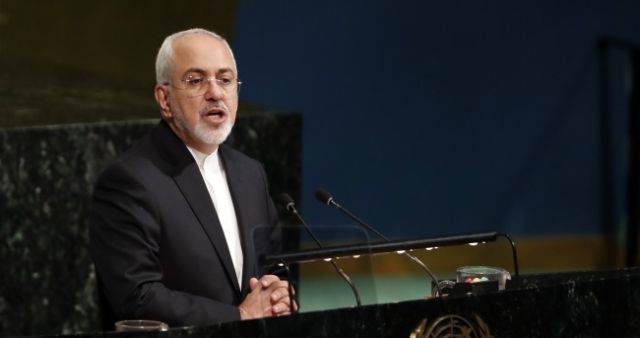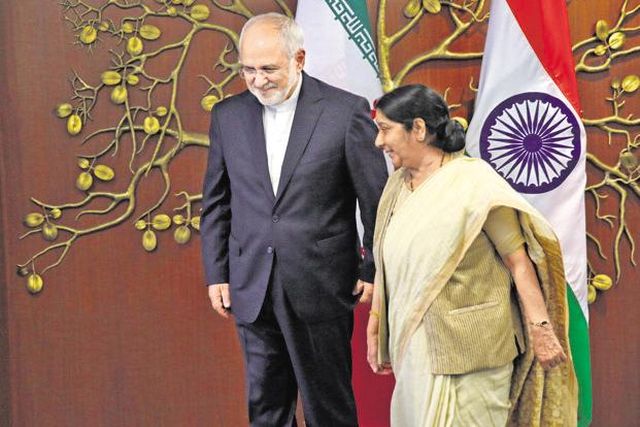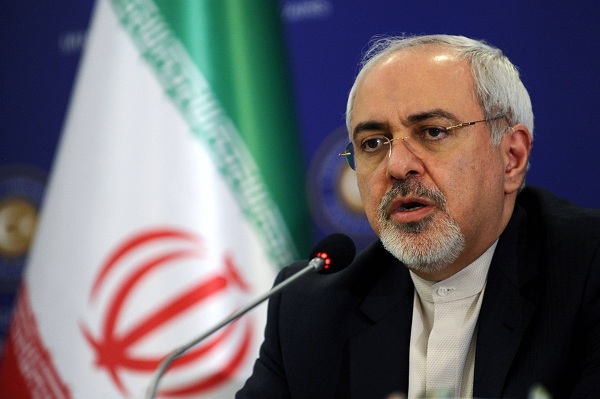
by admin | May 25, 2021 | Muslim World

Mohammad Javad Zarif
Tehran : Iranian Foreign Minister Mohammad Javad Zarif said that the Islamic republic will maintain supports for Palestine’s “resistance” groups, official IRNA news agency reported.
“Iran will support the Palestinian resistance groups against Zionist (Israeli) regime’s occupation and aggression,” Zarif was quoted as saying by IRNA on Sunday.
Zarif made the remarks in a meeting with the Secretary-General of the Palestinian Islamic Jihad movement Ziad al-Nakhala, in the Lebanese capital Beirut, Xinhua news agency reported.
Ziad thanked Iran for its support for the Palestinian cause and the Palestinian nation.
The two sides, discussed the latest developments in the “occupied” lands of Palestine.
Zarif arrived in Beirut on Sunday to hold talks with senior Lebanese officials on the boost of ties.
—IANS

by admin | May 25, 2021 | Corporate, Corporate Governance, News, Politics
 By Arul Louis,
By Arul Louis,
United Nations : External Affairs Minister Sushma Swaraj and Iranian Foreign Minister Mohammad Javad Zarif discussed US sanctions against Tehran amidst American President Donald Trump issuing dire warnings at the Security Council against violating the embargo.
India and Iran “shared each others’ position about where we stand at this point of time” on the sanctions, External Affairs Ministry spokesman Raveesh Kumar told reporters after the Ministers’ meeting on the sidelines of the UN General Assembly session here on Wednesday.
At the Security Counci, Trump said that the sanctions against Iran will come into full force in November and warned “any individual who fail to comply with these sanctions will face full consequences”.
Kumar said that India was engaged with all the stakeholders dealing with the sanctions and, therefore, it discussed it with Iran also.
Zarif told Sushma Swaraj about Iran’s interaction with the European Union (EU) and other countries over the sanctions, according to Kumar.
The spokesman said that Iran and India had “civilisational ties” going back in time and the discussions went beyond the sanctions issue.
Trump pulled Washington out of the nuclear deal known as the Joint Comprehensive Plan of Action (JCPOA) that Iran signed with the five permanent members of the UN Security Council, Germany and the EU, to end sanctions in return for Teheran stopping nuclear weapons development.
The EU and most countries back the nuclear deal and oppose US sanctions and Trump found himself isolated at the Security Council.
Washington’s allies, British Prime Minister Theresa May and French President Emmanuel Macron, openly opposed Trump at the Security Council meeting and expressed their support for the agreement with Iran.
Kumar declined to comment on foreign media reports that India was going to stop importing Iranian oil.
(Arul Louis can be reached at arul.l@ians.in and followed on Twitter at @arulouis)
—IANS

by admin | May 25, 2021 | Interviews, Muslim World

Iranian Foreign Minister Mohammad Javad Zarif
Tehran : The US is addicted to applying sanctions on Iran, Iranian Foreign Minister Mohammad Javad Zarif told CNN in an exclusive interview.
“I believe there is a disease in the US and that is the addiction to sanctions,” he told CNN on Sunday from Tehran.
“Even during the (former President Barack) Obama administration, the US put more emphasis on keeping the sanctions it had not lifted rather than implementing its obligation on the sanctions it lifted.”
The interview is the first Zarif, the key architect of the complex nuclear deal between Iran and the West, gave to Western media since some of the US sanctions against Tehran were renewed last week.
The US-educated minister gave the interview in English on the 65th anniversary of a Washington-backed coup that overthrew democratically elected Iranian Prime Minister Mohammad Mossadegh.
Zarif retained a clear belief during the hour-long interview that the nuclear deal could be revived regardless of President Donald Trump’s administration’s denunciation of it.
In May, Trump withdrew from the deal, known as the Joint Comprehensive Plan of Action (JCPOA) and intended to limit Iran’s nuclear ambitions in exchange for sanctions relief, calling it a “horrible one-sided deal that should have never, ever been made”.
The first wave of sanctions that were to “snap back” under the administration’s move hit the import of car parts and precious metals on August 6.
Zarif expressed his dismay that the US has not learned that sanctions were ineffective in changing the political climate in Iran.
“We felt that the US had learned that at least as far as Iran is concerned, sanctions do produce economic hardship but do not produce the political outcomes that they intended them to produce, and I thought that the Americans had learned that lesson. Unfortunately I was wrong,” the Minister told CNN.
He said that the same ’50s thinking embodied the current US approach.
“I think the US administration still believes that it is working with the government it installed in Iran after the 1953 coup,” he said, adding “As they say, they have to wake up and smell the coffee.”
For much of the interview, Zarif appeared to dismiss the possibility of future talks with the Trump administration and maintain the hope the deal can be revived.
“We do not want to revisit that nuclear deal… We want the US to implement that nuclear deal. Today the closest US allies are resisting those sanctions. The US basically arm-twisting — its attempt to put pressure. I don’t want to use the term bullying … (but) that’s what it amounts to.”
Additional sanctions are due to hit Tehran in November against the Iranian oil industry, which accounts for a fifth of the country’s GDP.
—IANS

by admin | May 25, 2021 | Muslim World

Mohammad Javad Zarif
Tehran : Iranian Foreign Minister Mohammad Javad Zarif has said the ministerial meeting of the remaining parties to the international 2015 nuclear deal was “constructive”.
“I believe that there is a political will to continue work and save this agreement but we must see what will happen to this issue in practice,” he was quoted as saying by Press TV on Friday.
On Friday, a ministerial meeting on the Iran nuclear deal, also known as the Joint Commission of the Joint Comprehensive Plan of Action (JCPOA), was held in Vienna, capital of Austria, Xinhua news agency reported.
The meeting was chaired by EU High Representative Federica Mogherini and attended at the ministerial level by China, France, Germany, Russia, Britain and Iran.
Zarif said Iran received an economic package from the European countries two days ago but Iranian President Hassan Rouhani said it is not enough.
On Thursday, Rouhani said the proposal package offered by the EU does not secure Iran’s interests in the 2015 deal.
“Unfortunately, in the proposed package, there is no practical measure and specific strategy for cooperation,” Rouhani said in a telephone conversation with German Chancellor Angela Merkel, according to IRNA news agency.
The package encompasses “a number of generalities about EU commitments which have also been issued before,” he said.
“We expected a vivid plan from the three European countries” of Germany, France and Britain, two months after the US pullout of the JCPOA, the Iranian president noted.
Merkel confirmed that the EU package contains some principles and generalities, stressing that the talks should continue over the details.
“We all know that we want to stay in the nuclear deal, and we believe that we should keep talks in a quite atmosphere,” she said.
In another telephone conversation with his French counterpart Emmanuel Macron on Thursday, Rouhani also underlined the need to meet the demands of the Islamic republic by the parties to JCOPA.
The Iranian President highlighted the problems that Washington’s unilateral withdrawal from the JCPOA has created for the European companies involved in Iranian projects.
“We expect Europe to offer a clear operational programme with a specific timeframe in order to be able to compensate for the US pullout from the Iran nuclear deal,” Rouhani said.
Rouhani has urged the European signatories to the JCPOA to take “practical and tangible measures” to protect Iranian interests after the US pullout.
On Friday, Zarif told reporters in Vienna that Europe must translate its commitment into action before the re-imposition of the US sanctions on Tehran.
—IANS

by admin | May 25, 2021 | Muslim World

Mohammad Javad Zarif
Tehran : Iran’s Foreign Minister Mohammad Javad Zarif has urged international condemnation of US attitude towards Iran’s 2015 landmark nuclear deal, the media reported.
In letters to his counterparts of a number of countries, Zarif on Sunday warned of the dangerous consequences of the US “illegal and unilateral” move to pull out of the nuclear agreement, officially known as the Joint Comprehensive Plan of Action (JCPOA), Xinhua reported citing Press TV.
He called for international condemnation of what he called Washington’s “extremism,” urging the world to withstand US “lawbreaking and bullying behavior.”
“Illegal withdrawal of the US government from the JCPOA… is challenging the goals and principles of the Charter of the United Nations and the efficiency of international bodies,” the Iranian Foreign Minister said.
Likewise, the US withdrawal from the JCPOA was the country’s biggest effort aimed at violating and weakening the nuclear accord and the UN Resolution 2231, adopted in July 2015 to endorse the historic deal, he said.
Zarif further said the JCPOA put an end to an “unnecessary crisis” which lasted for more than one decade.
He emphasized that the agreement’s scope, regulations and time frame were the outcome of “accurate, sensitive and balanced multilateral” talks and it is impossible to make any changes on or hold new negotiations about them.
US President Donald Trump announced on May 8 to pull out of the treaty, and vowed to re-impose sanctions on Iran, which was alleviated under the JCPOA.
Iran has said that it will stay in the deal as long as the other five powers remain committed to it despite the US pullout.
—IANS



